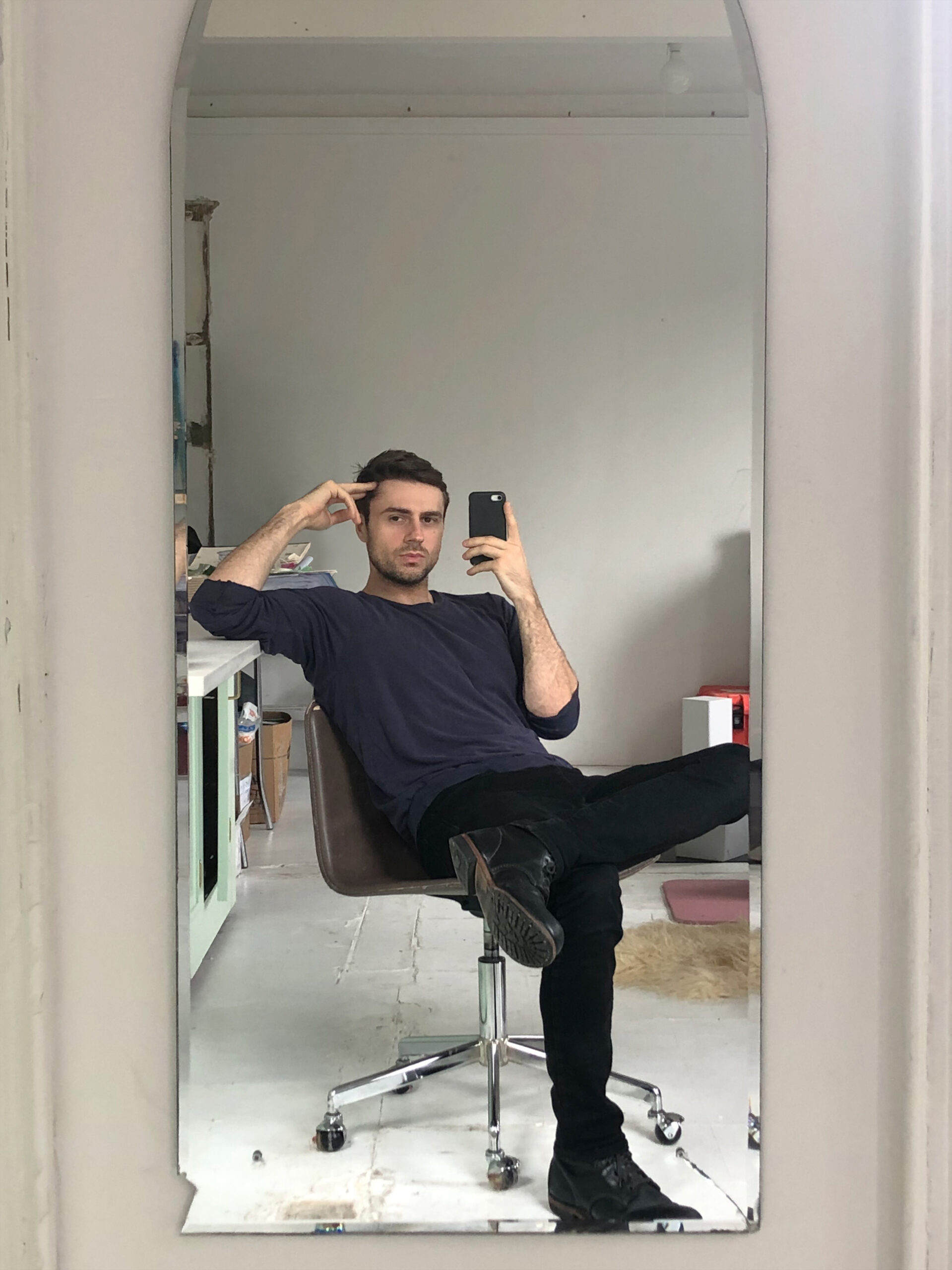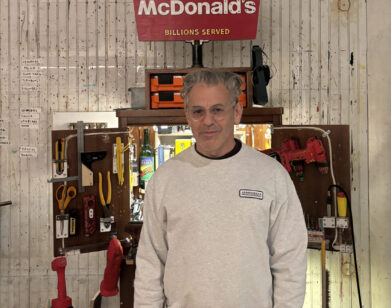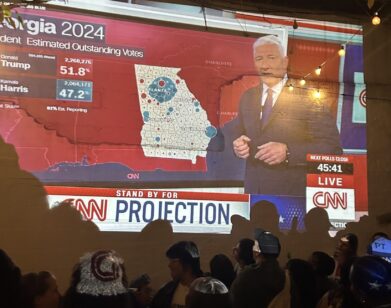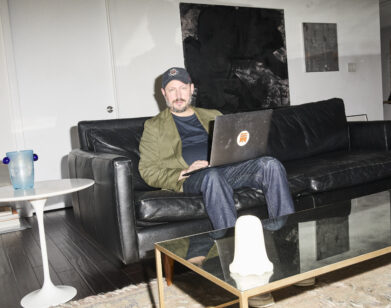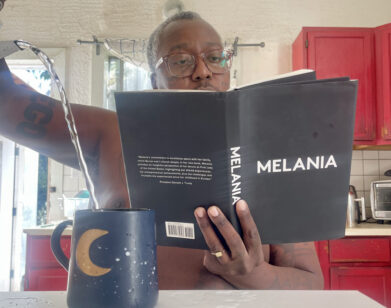DUDES ROCK
Joshua Citarella Takes Us Into the Dark Corners of the Manosphere
I first encountered Joshua Citarella’s work during the height of the pandemic. I had just moved to Oakland, dyed my hair purple, and taken a job pouring beers at a taqueria. My only friend was the hot skater I was dating who introduced me to Hito Steyerl, Drain Gang, and Monday Night Memes, Citarella’s weekly Twitch streams where he performs live research on the most unhinged corners of the internet, plumbing the depths of 4chan and kiwi farms in search of the esoteric conspiracy theories, hyper-niche political ideologies, and unproven alternative medicine techniques. Citarella’s streams would deepdive into fringe online political factions like Neo-Monarchism, Anarcho-Primitivism, Paleo-Libertarian Distributism or Dharmic Eco-Reaction with Transhumanist characteristics, seamlessly segueing into tales of the hollow earth or Starseeds, an online community who believe they are alien souls trapped on Planet Earth. Even when he was exploring the most implausible masculine pseudo-science—could drinking raw onion juice really increase your testosterone? would lifting weights actually make you more conservative?—Josh’s background as an adjunct gave the streams an academic flavor.
But in 2021, Joshua quit teaching to form the online publishing platform Do Not Research. Meanwhile, I got a haircut and moved back to New York. Then I enrolled in graduate school and started working on my first book, Flat Earth, a short novel about American masculinity and conspiracy theories, some of which, subliminally or otherwise, had been copy-and-pasted from Citarella’s 2021 project Auto Experiment: Hyper-masculinity, wherein he tested every “internet folklore male improvement technique” he could get his hands on including semen retention, mewing gum, and the InfoWars supplement Super Male Vitality. Earlier this month, at his new studio in Chinatown, we met up to finally get to the bottom of what is going on with men.
———
JOSHUA CITARELLA: You have recently graduated from your MFA at Columbia.
ANIKA JADE LEVY: Thanks.
CITARELLA: Congratulations to you.
LEVY: Yeah, summer camp to write your book kind of deal.
CITARELLA: Well, speaking of, you have written a book.
LEVY: Yes. I’m finishing the last two chapters right now. I’m working with a really cool editor on it. The book is called Flat Earth.
CITARELLA: That’s a good title.
LEVY: Thanks. There’s a lot of the kind of accelerated masculinity stuff in it. In fact, I was writing a new draft of it and I was like, “Josh might read this,” and he’s going to be like, “Oh my god, she totally ripped all of this from me.”
CITARELLA: I took it from 4chan. Nobody owns it.
LEVY: You looked at 4chan so I didn’t have to, which I really appreciate. During the pandemic, I started watching Monday Night Memes pretty religiously.
CITARELLA: I’m so sorry that happened to you.
LEVY: Then, when you started doing Auto Experiment, I became completely obsessed with that project. I was so interested in this body modification masculinity and optimized digital masculinity. I was like, “Oh, this all came from that project.” You should talk about Auto Experiment.
CITARELLA: For people who have not encountered the piece, I experimented with all of the male improvement techniques that are popular on sites like 4chan and Reddit and a whole variety of other things, stuff that is between internet folklore and pseudoscience. Portions of it are quite real. I was surprised by that. I’ve spent the last few years looking at radical internet subcultures on the left, right, up, down, and sideways. A large part of that project is separating the absolute nonsense from the gems of truth. There are things that float in the contemporary newsfeed or zeitgeist that are factual and are assumed to be conspiracy theory. For example, we could talk about receipts containing bisphenol A—BPA—which is absorbed through the skin subcutaneously and metabolized in your body as estrogen, and maybe estrogen effects related to soy. Mewing, for example, where you’re either using these overpriced plastic bite guards. This is assumed to be duping people who are insecure and are probably stupid financially. The bite guard is clearly overpriced, but the idea that through resistance training, you couldn’t increase the size of your masseter muscles and make a more Chad-like handsome jawline, that is just clearly untrue. I did it. I look different. I’ve seen people in the discord do it, and then they look different. People who have teeth grinding, they will sometimes get Botox into their masseters. Additionally, it can be used as a soft facial feminization if you want to have a less chadded jaw.
LEVY: On the one hand, the surprise of this project was that it was really successful, it seems like. But I remember one of the original ambitions of it was to test the theory that physically stronger men are less inclined to have left wing politics or to believe in wealth redistribution. That part didn’t happen. Your politics haven’t changed.
CITARELLA: No, my politics have not changed, although I’m now much more physically fit. My mind was already made up. I had done the reading. I was in art and tech reading groups talking about Bitcoin and extreme libertarian ideas in 2011. I’ve been here for a dozen years and I feel pretty settled on what kind of projects, governance systems, communications technologies are useful and what ones are not. But obviously, the perception exists online that people of left wing political politics don’t care about fitness. I think that’s a huge missed opportunity. For me, what I wanted to do was take those ideas in as good faith as they are presented, do all of it rigorously, some of it very painful, some of it very difficult to do, which I documented through my social media, Instagram stories, Monday night streams. People saw me transform over that period, and then, you just have to try and then see if it’s true. Within this whole gradation of interesting stuff are kernels of truth, but there’s also a whole bunch fucking nonsense. Like, sunning your balls is not real.
LEVY: One thing I really like about this project but also your work in general is you’re really adept at being a vessel for the culture without totally removing the critical lens. At the same time, in spite of the fact that you’re somewhat of a bleeding heart leftist, you really care about young men.
CITARELLA: I take a lot of influence from libertarian thinkers and economists, and I’m holding my ideas. I think ideological trends have peaks and valleys, boom and bust cycles. When something is in, it’s really cool. Then when it’s out, it’s hard to get a platform for that kind of project. I’ve been doing pretty much the same thing for a decade. For me, that slow burn and steady build is indicative of creating more durable, sustaining value rather than speculative value that goes through boom and bust cycles. I try not to be swayed by trends. I was really interested to talk to the predominantly young men that I interviewed in the last few years, some of whom had really right-leaning politics. When I would explain to them what a social democratic program would be, that totally resonated with their economic populist rhetoric of Trump or JD Vance or Josh Hawley. I would like to see this enormous, broad coalition. We actually need those people. This is not negotiable or controversial. We need those people to vote for reshoring industry. We need them to vote for all of the housing and infrastructure that has to happen. I just don’t really see any political path forward for a left that wants to exclude those people.
LEVY: I grew up in a rural, de-industrialized, former mining town in Colorado and I knew countless young men who went from voting for Bernie in the primary to Trump in the general. It was a pipeline. And people don’t believe this exists.
CITARELLA: That’s my fucking job right there. Those are the people that I care about that no one else is talking to. Most of the issues in the newsfeed don’t represent the interests of the overwhelming number of people in this country that have been downwardly mobile for 40 years of neoliberalism. When something comes to the table and you know that you have a material interest in that policy, you’re going to be very aware of it. But in terms of tiny incremental changes that accumulate, [that’s like] rearranging the deck chairs in the Titanic.
LEVY: So much of the thesis of Auto Experiment is, you talk about Super Male Vitality as this incredibly intoxicating drug that should really only be used recreationally, you say.
CITARELLA: Yeah, there’s some kind of toxic component of buildup in your testes if you abuse one of the active ingredients in there. If you do end up taking Tongkat ali, the compound, you should be cycling on and off it so you don’t develop some kind of problem in your balls, basically.
LEVY: I bet. You recently covered this phenomenon where the ingredients in Alex Jones’s InfoWars supplements and Gwyneth Paltrow’s Goop supplements are sort of the same thing. It’s just like the two genders, so to speak.
CITARELLA: Yeah, they’re literally the same thing. And If these two companies who seemingly have diametrically opposed political beliefs, if they’re selling you the same material ingredient—I’m a materialist at root, so the politics stem from the material reality. There’s a number of things that overlap between these two different spheres, and it’s not just the supplements. It’s things like solar panels that you see sold under survival sites like InfoWars and ethical consumer sites like Goop. You also see rainwater collection barrels, rooftop gardens, all sorts of alternative medicine things. There’s some kind of implicit politics within all of those materials that regard self-sufficiency, hyper individualism, and a total foreclosure of collective politics such that you can imagine you’re not reliant on a nuclear power grid. The end trajectory for both InfoWars and Goop in this hyper individualist future is that you live off the grid. You have your own solar panels to which you are completely self-sufficient. You’re stockpiling dried goods in the basement. You have Ayurvedic medicine. You’re using red light therapy literally sold on Goop for $10,000 and the balls-sunning machine on InfoWars. It’s the exact same shit.
LEVY: It’s astonishing and unsurprising that the project of hyper-consumerist, hyper-individualism that kicked off in the ’50s has now evolved into a political subjectivity of every man for himself. I think bunkers are only going to get more and more popular. The town that I grew up in was reasonably working class and is now just a haven for billionaires coming in and making bunkers.
CITARELLA: Because you’re in the middle of the country where it’s safe.
LEVY: You’re in the middle of the country and it’s between these two massive mountains. It’s sort of an ideal place to be in the event of a nuclear attack. It’s very beautiful. There’s a lot of fresh water. It’s gorgeous.
CITARELLA: When you go back, do you feel more alienated from the way your hometown has changed, or more alienated in New York? New York can be a pretty extreme environment on its own.
LEVY: I try not to feel alienated anywhere. I try to understand where people are coming from, and it makes sense that in towns like that people who have been so disregarded by the Democratic Party are radicalizing and, of course, they’re stockpiling guns because what choice do they have? It makes a lot of sense to me what we’re seeing on web forums and I think it’s really sad.
CITARELLA: Yeah. These people have internalized a philosophy of, “I’ve got to stockpile guns and be absolutely self-sufficient because there’s no one here to take care of me.” They’re not wrong about that. This is the Democrats’ problem. They need to fix it. But in the meantime, we shouldn’t be standing between these people and judging them for their political beliefs or trying to do deradicalization work. That needs to happen from the top down. We’re only assisting them in doing their dirty work if we try to prevent this stuff or put it down too early.
LEVY: Back to Auto Experiment for a second. What do you think was going on in the summer of 2021 that made you want to do this project?
CITARELLA: What was going on with me, or in the world?
LEVY: On the internet, in the world. You talk about trying to anticipate a cultural trend rather than just regurgitating it, but certainly something was in the air.
CITARELLA: I would say that I’ve been in the trenches on this stuff since 2015. I’ve seen a lot of Nazi shit in my time. 2018 was kind of the heyday where social media really felt like, “Oh, the people who run this have lost control. Some insane shit is happening.” But I would say that a lot of the fitness stuff was always there in the background. The people who had politics that were explicitly organized around race, those people got wiped out. The people who could remain on the platforms would have to cloak their politics of ethno-nationalism and race into something else, which is fitness, like vitality and white male physiques and things like that, or they’re making music, or I don’t know, they’re making recipes. Then, the recipes also have to do with their very sustainable materials that you could grow on a homestead because you anticipate the collapse of industrial society. I would say probably in the era that you encountered it, what was doing well in the algorithm and what a lot of that interest had rushed into was these content creators who had implicitly but not explicitly racist politics. One of these characters in the recent magazine, there’s just a book about the importance of race in building a nation. It’s like, “Oh, boy, okay. I thought we were playing it on the down low.”
LEVY: No one’s trying to hide it anymore. I hate to say it, but it’s Elon Musk’s Twitter. Even the fetishization of the athletically perfect male specimen in a homosocial context feels like a space that’s meant to exclude women, and obviously people of color as well. It’s like they’re trying to become the Greek statue avatar.
CITARELLA: A lot of them are not looking so good. I don’t know how to say it nicely. They’re just schlubby stoop-shouldered nerds. But going back to this thing you said about Elon Musk’s Twitter, I think there are people, in the 2018 era before everybody got de-platformed, where if they were actually given a proper platform from which to say their ideas, they would be laughed out of public because they are ludicrous. I think that’s actually a beneficial thing. I’ve always argued against de-platforming because it creates these weird cliffs in ideological space where you cede an important topic to somebody that you’re fighting against.
LEVY: Censorship is only going to push people to more secluded corners of the internet. Censorship isn’t going to deradicalize anyone.
CITARELLA: Every platform migration thins the herd, but those who remain grow more radicalized than ever. You have a very concentrated population of extremely radical people and, in some cases, it’s more beneficial to have a large diffuse population of mildly radical people. In a majoritarian democracy, that may be vastly preferable.
LEVY: Well, I think it’s incredibly useful to provide an on-ramp to a form of confident masculinity for young men that isn’t just strictly racist or misogynistic.
CITARELLA: Why are you so interested in masculinity?
LEVY: I don’t know, it feels like a very essential part of being alive and being online right now. [In writing my own book] I really wanted to be a vessel for what was happening culturally and have this be a temperature-taking, but it felt like one of the most important things happening on the internet. I didn’t see a lot of healthy options for young men. I don’t know. I love men, I guess.
CITARELLA: Your friends from back home, talking of this process from ’16 to 2020, and now we’re ramping up to 2024. Where are they on these questions? LEVY: My guess would be that they’re non-voters.
CITARELLA: Most people are non-voters.
LEVY: Again, it’s just everyone is becoming increasingly individualistic, and it feels like that’s all you can do is try to get enough money to grow your own food. Your work has this texture of applying a really rigorous and research-intensive and academic lens to the most alienating and esoteric corners of the internet. Do you still think of yourself as an academic?
CITARELLA: I think a fulfilling intellectual life probably doesn’t happen in the academy for a long time. If we weren’t on the record, I would ask you how you felt being in an MFA program, but we’ll do that after.
LEVY: No, I loved the MFA. I had access to some really, really amazing faculty, and I thought that there would be a much stronger, viscerally negative reaction to my work, which there wasn’t. There was a real critical engagement with it.
CITARELLA: Wow. That’s wonderful.
LEVY: You were teaching SVA, is that right? Before the pandemic?
CITARELLA: SVA, and then RISD.
LEVY: So you were adjuncting at these various art institutions, not really making a decent living, and then you broke off to form Do Not Research, which is arguably a new institution that’s providing real educational material for people. The transition was from working on research-heavy projects to Auto Experiment, hypermasculinity. I think it’s a performance project. Would you call it that?
CITARELLA: I came up in an era where people of the post-internet generation of artists did performance, but performance was also posting. It’s between those two poles of performance art and posting.
LEVY: Back to the subject of my own neurotic interest in masculinity, I think I very easily could have been onboarded to the highly misogynistic, flippant, apolitical, Red Scare contingent. I nearly was, and I get it, because in New York right now, you could certainly look around and say that women and gay men have a totally outsized degree of cultural capital. But go anywhere else in the world and the patriarchy will really grind your gears. I want to ask your opinion on the state of masculinity discourse in general, and whether or not you think this sort of masculinity-maxing is an American phenomenon or an American export.
CITARELLA: That’s a good question. I’m just running through all the different influencers in this space. I want to say the majority of them are American, but I wonder if that’s just because the majority of famous content creators are also American. I would say it’s probably most present in the US, and I’m mostly concerned with American politics because that’s where I live, and that’s where my family is.
LEVY: How do you trace the return to tradition crowd? What is that lineage? My experience of just being a regular girl online, I obviously voted for Bernie in the primary in 2016. But I fucking wore white to vote for Hillary Clinton in the general. Then, I don’t know what happened. Seeing the reactionary, seemingly anti-feminist, anti-Me Too discourse emerge right as I was finishing college was such a revelation to me, because none of that was happening in the academy at all. I just had no exposure to it. It seemed like such a breath of fresh air. I was like, you won’t believe what these girls are saying. But then it just saturated everything. In terms of outsized political influence, like Red Scare, you look at those girls and they’re two of the most influential women in the country, which is unhinged.
CITARELLA: I think the populist upset of 2016 shook the academy, rightfully so, and shook cultural institutions, and everyone has recalibrated to now position themselves in
opposition to that. This would be my grand summary of all these topics. In the insurgency of the Trump campaign, many different people from different ideological perspectives try to attach themselves to that interest. Then, you have the alt-right proper. You also have paleo conservatives. You have network-state libertarians. You have heterodox economic populists like JD Vance and Josh Hawley. All those people have very important disagreements with each other. All of those worldviews are totally incongruent, but they all try to attach themselves to the Trump campaign and try to wield new influence in academia and institutions and in the mainstream discourse. The question for people is whether the insurgency of the populist moment represents an opportunity to tear down the existing structure and remake it as something new entirely. But for people like me, who come from a social democratic background, who want to see majoritarian democracy, the Trump insurgency represented a breaking with neoliberalism and represented the opportunity to restore actual democracy that had waned within the neoliberal period. I want to get rid of neoliberalism, and those guys want to do neoliberalism 2.0. That doesn’t sound good to me.
LEVY: January 6th, I think, represented this massive aesthetic rupture. I don’t know if you saw the video of the girl hitting the weed pen at Nancy Pelosi’s desk…
CITARELLA: I didn’t, that’s pretty funny though. There’s an important distinction for January 6th that, although those people were deeply mistaken that the election was not being stolen from Trump, and Fox News has just lost the largest defamation lawsuit in American history by five times to Dominion voting machines. It was fraudulent from the very beginning. But even under that mistaken assumption, those people were storming the Capitol with the auspice of protecting democracy. They thought mistakenly, but they thought a legitimate democratic election had been stolen. That is really important in that they were not storming to have a coup knowing that they had lost the election. All of that said, I would say there’s important distinctions between the rhetoric of 2016 and what actually happened in the office during the Trump administration, so I find all that very disappointing. But that rhetoric separates the Trump from Trumpism, and there’s really something to work with there. There’s John Deere workers who are striking, wearing MAGA hats and camo pants. Those are the guys that we need to rebuild robust trade unions in the United States. We can’t do away with them.
LEVY: There is a growing population of young people, and young men in particular, to whom no political ideology corresponds. If the left wing isn’t smart enough to absorb them or to offer them literally anything, they’re going to end up where they end up.
CITARELLA: I totally agree. This is all great. Why don’t you just tell me more about the book?
LEVY: I’m 80% finished. It’s like my life’s work. I guess I was thinking about feeling conspiratorial and feeling the ways that rural, industrial tides were brushing up against the New York City art world. People just don’t have any sense of how people live, especially in the Rust Belt. The ruins of the Rust Belts are just weed dispensaries. That’s the industry, that’s the commerce, and Colorado is obviously at the forefront of that. I don’t think that’s good for young men either. I understand why young men feel neutered, and I can only imagine how fucked up my politics would be if I had been a young man and had stayed in that town and felt so culturally and economically disenfranchised.
CITARELLA: The great irony of the DNC right now is that we have people from a whole diverse array of backgrounds who are in these extremely elite positions, who come from extremely privileged backgrounds in many cases, and they seem to think that class is just not important, in that a working class white man in Colorado is in some ways oppressing a person of color who’s in a prestigious academy. There’s a massive gap between their quality of life and their economic opportunity, and that class analysis has just become very, very unpopular as our institutions have been captured by elite interests.
LEVY: I don’t think it’s a coincidence that the proliferation and ubiquitousness of identity politics has resulted in the total disappearance of class solidarity.
CITARELLA: Yeah. It’s supposed to be a replacement for it.
LEVY: That’s the real great replacement.
CITARELLA: That’s good. That’s a fucking great line.

